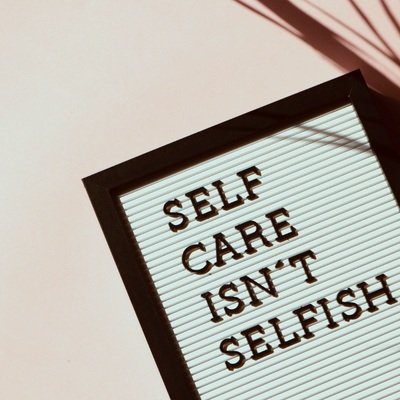Putting Self-Care into Practice
Self-care is a term that I have heard a lot in my life, especially in my career as a helping professional. For the most part, everyone knows that self-care is the key to preventing burnout, improving mental and spiritual wellness, and succeeding in executing long and short-term goals.
The phrase “You can’t pour from an empty cup” is a popular mantra that reminds us that self-care is not a selfish act but necessary to care for ourselves and properly care for others. Despite this widely known and accepted wisdom about the importance of self-care, many of us continue to struggle with the mentally exhausting and emotionally damaging impact of overexertion and self-neglect.
So if we know how important self-care is, why do we often fall short in practicing it?
Common Barriers to Self-Care
Cultural Expectations
The hustle-and-bustle culture of many major cities that thrive on capitalism and efficiency can create a sense of guilt around slowing down. This is also true regarding the smaller organizational culture of individual employers. In my experience as an agency social worker, I noticed that many organizations have a theoretical understanding of self-care (and may even verbally encourage it) but often fall short of creating an environment aligned with employee self-care. This divide becomes evident in the workplace through unrealistic expectations around deliverables, failure to offer compensation for required overtime, and very limited paid-time-off packages for employees.
History of Traumatic Experiences
On an individual level, certain experiences in life can make it difficult to recognize the need for self-care, let alone practice it. For example, the existence of trauma in a person’s history can rewire their brain, leaving them in a near-constant state of “survival mode.” This is especially true in the case of complex trauma, which is the impact of prolonged and repeated exposure to traumatic people, situations, or environments.
The existence of unresolved trauma can make self-care feel inaccessible to many, as the traumatized body and mind are always on high alert for potential threats. In such cases, seeking support like online therapy for individuals can provide a safe space to process trauma and develop self-care routines that feel accessible. With this guidance, individuals can slowly reclaim their ability to rest, relax, and heal.
The Many Faces of Self-Care
Even in the absence of personal trauma or cultural/organizational pressures, self-care can be a tricky nut to crack. Often, the term self-care brings to mind an image of a day at the spa, a fuzzy bathrobe, a glass of wine after dinner, etc. But it is a much more dynamic concept than that, and it looks different to everyone at different times.
While sometimes the fuzzy bathrobe or spa day might just do the trick, unfortunately, self-care is often much less glamorous and, at times, can even feel like work in and of itself. Regardless of the approach used to provide self-nourishment, certain factors are an absolute necessity across the board:
Self-Awareness:
Pause & Check-in.
Self-care begins with self-awareness. In this context, this refers to knowing your limits and noticing when you are approaching them so you can implement steps to prevent yourself from pushing too far. Self-awareness can be cultivated in many ways, including through online therapy for individuals, which helps recognize patterns and set boundaries. A simple way to begin is to make a habit of pausing and feeling the physical and emotional sensations that are present in your body. Once you know what is happening within you, you can make an informed decision about the type of self-care you need at the time.
Here is a list of sensations you might become attuned to, and some proposed self-care solutions for each:
Boundaries
Create space for yourself.
Knowing what you need is half the battle, but what good is it to know what you need if you don’t feel capable of creating the space necessary to give it to yourself? To make space to care for yourself, it is sometimes necessary to prioritize yourself above other people’s conflicting wants or needs. This can be challenging, but professional support through online therapy for individuals can help you develop strategies to set and maintain boundaries effectively.
Self-compassion
Give yourself grace.
Healing and growth is a journey—one that is generally non-linear in nature. Some days, you will be on your A-game: eating well, going to bed early, managing tasks efficiently, and nailing your self-care routine. But other days, old habits can creep in, and life’s stressors might feel intense.
In these instances, you may find yourself agreeing to something even when you know deep down you don’t have the bandwidth to complete the task. You might reach for junk food, even though your body needs healthier nutrients. You might continue to hit snooze even though you promised yourself you would get an early start. At times like this, kindness is the best form of care you can offer yourself. If you struggle to give yourself grace, online therapycan help you shift from self-criticism to self-compassion.
If only self-care were as simple and straightforward as the occasional trip to the spa! Instead, it is a nuanced practice that can involve many obstacles and several rounds of trial and error. Setting the intention is the first of many steps to success. Once you decide that you are a person worth taking care of, just as much as anyone else is, the possibilities for your growth will open up in abundance.
As you go about the rest of your day, week, or month:
When you hear yourself asking, “What do I feel like doing?” change the question to, “What will help me to have a better experience of being alive today?”
Give yourself kindness when you fall off course, and then start again.
Different needs require different tools. Remember to match your approach to the thing you need.
Care for yourself as you would your child or a loved one.
—|—
Thank you for being a presence for us, for yourself, and for others.
We are so glad you’re here.











